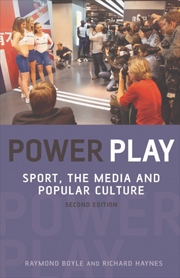Book contents
- Frontmatter
- Contents
- Miscellaneous Frontmatter
- Preface
- Acknowledgements
- 1 Sport, the Media and Popular Culture
- 2 All Our Yesterdays: A History of Media Sport
- 3 A Sporting Triangle: Television, Sport and Sponsorship
- 4 Power Game: Why Sport Matters to Television
- 5 Who Wants to Be a Millionaire? Media Sport and Stardom
- 6 The Race Game: Media Sport, Race and Ethnicity
- 7 Playing the Game: Media Sport and Gender
- 8 Games Across Frontiers: Mediated Sport and National Identity
- 9 The Sports Pages: Journalism and Sport
- 10 Consuming Sport: Fans, Fandom and the Audience
- 11 Conclusion: Sport in the Digital Age
- Bibliography
- Index
4 - Power Game: Why Sport Matters to Television
Published online by Cambridge University Press: 05 August 2013
- Frontmatter
- Contents
- Miscellaneous Frontmatter
- Preface
- Acknowledgements
- 1 Sport, the Media and Popular Culture
- 2 All Our Yesterdays: A History of Media Sport
- 3 A Sporting Triangle: Television, Sport and Sponsorship
- 4 Power Game: Why Sport Matters to Television
- 5 Who Wants to Be a Millionaire? Media Sport and Stardom
- 6 The Race Game: Media Sport, Race and Ethnicity
- 7 Playing the Game: Media Sport and Gender
- 8 Games Across Frontiers: Mediated Sport and National Identity
- 9 The Sports Pages: Journalism and Sport
- 10 Consuming Sport: Fans, Fandom and the Audience
- 11 Conclusion: Sport in the Digital Age
- Bibliography
- Index
Summary
In a world were you can download anything, you can't download live sport. Anything live becomes more important. The price paid by broadcasters [for live elite sport] will continue to go up.
(Greg Dyke, former Director-General of the BBC, The Observer, 28 October 2007)It is always difficult to explain the point of sport to those who do not like it. Non-aficionados will never be persuaded to take pleasure from ball skill or pace. But the level at which sport can be understood by anyone is as a story: as a narrative which must build to a decisive climax and in which character is revealed through actions.
(Mark Lawson, Forever England, Guardian, 2 July 1988)Introduction
Television to all intents and purpose controls large sections of contemporary sport. What we want to do in this chapter is examine some issues centred around the reasons why television is so interested in sport (in some sports more than others) and how this relationship alters what appears on our screens from that which we may witness in sporting stadiums. Part of this involves what Garry Whannel (1992) calls the transformation of sport by television, and we highlight some of these key practices below. However, as was evident from the previous chapter, a central element in the sport-television relationship revolves around the economics of the broadcasting industry, and its use of sport as ‘television product’ in the drive to secure audiences and subscribers.
- Type
- Chapter
- Information
- Power PlaySport, the Media and Popular Culture, pp. 66 - 85Publisher: Edinburgh University PressPrint publication year: 2009



